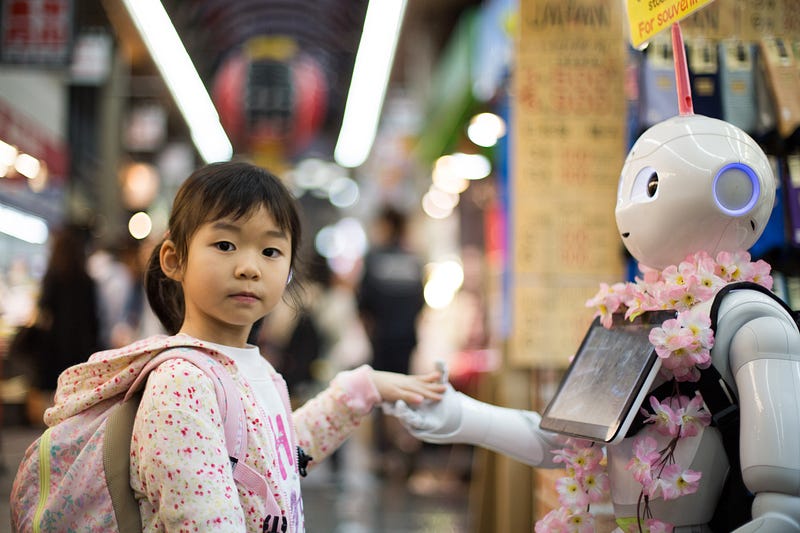Exploring the Future: What Will 2040 Look Like for Our Kids?
Written on
Chapter 1: A Glimpse into 2040
As I write this with my four-month-old resting on my chest after a long day, I can't shake the feeling that the topic of the future keeps reappearing in my thoughts. I previously explored this theme in a Medium article during my pregnancy. Now, four months later, I still ponder what the world will be like for my daughter when she turns 20 in 2040.
We find ourselves in an ever-expanding landscape of technology, data, and social networks. The number of smart devices sold was about 1.5 billion in 2013, which surged to 3 billion by 2020. In fact, a typical middle-class household in any country now possesses at least two internet-connected devices. It’s clear that the quantity of devices and the ways we connect will only grow. Despite being a long-time data consumer, I still struggle to leverage social media effectively. Just picking up my phone often leads to losing at least ten minutes.
I currently have 27 apps on my phone, excluding the default contact and settings applications, with 13 of them being social media or connectivity tools. This implies that half of the apps on my device are competing for my attention. What does your app usage look like?

Photo by William Hook on Unsplash
The doubt surrounding artificial intelligence has significantly diminished over the past five years. The major tech players—Amazon with Alexa, Microsoft with Windows 10, Google with its suite of free apps, and Apple with Siri—have transformed every PC and smartphone user into a potential data node. Whether we like it or not, an expertly crafted algorithm might understand us better than we do ourselves. Are we prepared to accept this reality? If we don’t master how to utilize technology to our benefit, our preferences and behaviors will be shaped by the apps we use.
Cloud technology makes data, apps, and settings accessible from any device, ensuring a consistent user experience. Google’s syncing feature is a prime example; once you sync your Chrome bookmarks, they’re available across all devices. Our phones and PCs are evolving into mere platforms for applications. Nearly all widely used applications are available on both desktop and mobile formats. Digitalization is destined to alter our lives in profound ways. Thanks to advancements in voice recognition, using applications has become hands-free. In fact, about 80% of this article was "written" using Google’s voice typing. PCs will offer a more holistic human experience through intelligent applications.
These changes are already unfolding, and I find them exciting. I work in the field of Intelligent Traffic Systems, but the potential for intelligence in everyday life is an even broader playground for technology firms. This is where my concern arises. Intelligence is derived from algorithms and data. Data from our lives is employed to create a model of us, which can be utilized for various purposes—optimizing traffic, connecting people online, suggesting restaurants, and curating social media feeds, to name a few. The more data available, the more precise the model becomes. To illustrate, if I were to provide you with a document detailing my Amazon purchases over the last six months, you'd quickly deduce that I have a baby girl. Now, if you're a friend on Instagram, viewing pictures of my baby and me in the park hints at summer approaching; theoretically, you could predict that I might soon buy sunscreen or summer dresses for her. Knowing my past purchases, you could estimate my budget and, if you owned a clothing store, drop flyers in my mailbox, similar to how Google displays shop recommendations. This model could be built not just for me but also for my four-month-old. I fear that by the time my child is ready to explore the internet, algorithms will have already shaped her online choices, influencing her offline behavior. A Netflix documentary titled “The Social Dilemma” discussed the ramifications of social media. It raised crucial questions about how we can safeguard our children from unregulated technology. The government and legal systems are lagging far behind tech advancements. I grapple with a larger question: What can I teach my child to prepare her for the future? How can I help her navigate social media and the internet without becoming a victim of it?

Photo by Andy Kelly on Unsplash
Boredom is a luxury. True learning often requires the space to explore thoughts and actions without constant busyness. I fondly recall creating my own plays during lazy Sunday afternoons. I worry my child may never experience that. Instead, she will have an endless stream of amusing animal videos at her fingertips. When math or science feels daunting, she can easily switch to watching puppy videos. Social networks won’t cultivate resilience or independent thinking. Even schools struggle to equip students with the skills needed to sift through the overwhelming data available today. Do you believe you possess that skill?
I recognize the many advantages digitalization has bestowed upon us, yet I also lament the absence of regulations for mobile applications like Instagram and Facebook. If you have children, have you shared similar concerns?
Chapter 2: Preparing Our Children for Tomorrow
In this chapter, we will delve into effective strategies for teaching our children to navigate the digital landscape responsibly.
The first video titled "The World in 2040 – Prepare to be SHOCKED by These Breakthroughs!" provides a fascinating glimpse into potential advancements and changes that could shape our lives in the near future.
The second video, "Ready For The World - Love You Down (Official Music Video)," presents a cultural perspective that complements our understanding of the future's societal changes.